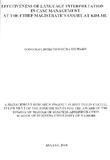| dc.description.abstract | Language is the most basic tool of management of cases by the courts. Lack of interpreting and or interpretation services prevents parties, victims, and witnesses from using the courts to meet their obligations and resolve their disputes. Without a skilled interpreter, a party who speaks or hears no English or has limitations in the use of English cannot listen to the testimony, challenge the evidence, or consult with an attorney. A person who cannot communicate with the judge faces a barrier as significant as a lock on the courthouse door.
Kenya is becoming increasingly diverse and multicultural. People who do not speak, hear, or understand either English or Kiswahili, the statutory languages of the court, are appearing more and more often in court as litigants and witnesses. Their need to communicate with the courts can be met through the use of qualified interpreters, but finding such interpreters is difficult. Interpreter problems are becoming an urgent management issue for many Kenyan courts, falling
into four broad groupings: firstly, determining the qualifications of interpreter candidates, then expanding the pool of qualified interpreters, to improving distribution of interpreters to make them available and affordable, and finally providing proper oversight 01 Interpreter work in court.
The research established that whereas most consumers of the services of the judiciary appreciate the role played by interpreters in court, most of them (consumers are not satisfied with the quality of interpretation as is being done currently. Courtroom work is a particularly difficult kind of interpreting, since it is highly procedural, moves quickly, and employs its own specialized vocabulary. From the interaction with the Respondents, it was established that the results often tum on the nuances of a written document, an exchange of words, or a party's intent. At the same time, testimony often involves street talk and slang in two languages, and a great deal of emotion may be conveyed in a few words. Even professional interpreters who perform well in community settings may be unqualified for the rigors of legal interpreting.
When a court uses an unqualified interpreter or no interpreter at all, the result is denial of access to court proceedings. The Kenyan Court of appeal has said that 'the right to an interpreter is fundamentally a right which safeguards the fairness of the process,' holding that interpreters must be appointed for criminal defendants in the interests of fair treatment and effective assistance of counsel. Fairness is equally important in civil cases such as divorce and property division, child custody and support, eviction, debt collection, or loss of a driver's license. Such cases can have a profound impact on people's lives.
When immigrants and deaf persons are forced to proceed with an inadequate interpreter or no interpreter at all, they are left with the impression that the government is indifferent to their participation. There is also a serious loss of accountability from proceeding with an unqualified interpreter. There are too few qualified interpreters at the Chief Magistrate's Court at Kisumu with the result that instead of the activity being a positive management tool in case management, the same has turned out to be an hindrance and a bottleneck.
There are no interpreters who can accurately, easily, and impartially convey a legal proceeding from English or Kiswahili to another language and back. At the same time, there are too many unqualified interpreters assisting the courts, people who should not be used in court if the goals are accuracy, completeness, and impartiality are compromised. Some courts are mistakenly content with whichever interpreter is most easily available; the untrained court clerk, or a friend or relative of the party. Unfortunately, many of these interpreters are woefully under-qualified for the job in ways that are not apparent to a person who does not speak both languages. | en_US |

